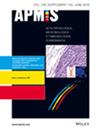Laryngeal squamous cell carcinoma (LSCC) is characterized by diverse profiles of tumor-infiltrating lymphocytes (TILs). We aimed to investigate the potential prognostic role of TILs and programmed death-ligand 1 (PD-L1) in patients with supraglottic LSCC. The expression of PD-L1 and TILs was assessed using immunohistochemistry in 39 patients with primary supraglottic LSCC and correlated with clinicopathological characteristics and disease-free survival (DFS). Survival curves were measured using the Kaplan–Meier method, and differences in survival between the groups were estimated using the log-rank test. TIL density was significantly higher in PD-L1-positive (combined positive score: CPS ≥ 1) than in PD-L1-negative (CPS < 1) patients (p = 0.000). Lower PD-L1 expression was significantly associated with a locoregional recurrence (Fisher's exact test, p = 0.008). DFS was significantly longer in patients with CPS ≥ 1 than in those with CPS < 1 (Log-rank test, p = 0.004). Multivariate Cox regression analysis showed that a low CPS (p = 0.003) and positive nodal status (p = 0.012) were statistically significant and independent predictors of malignancy recurrence. PD-L1 represents a valuable marker for predicting recurrence and shorter survival after definitive therapy.


